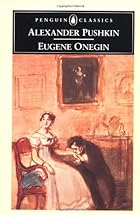 The high school I went to had a very different curriculum from most. The overwhelming number of choices we had for classes was amazing, and for an English and history loving geek like me, the best thing ever. I took elective classes like 20th Century Wars, an Asian history class, the Hero in Literature, Literary Outcasts, and Russian-Soviet Life. The latter class was a cross-departmental english and history class and we read some of the great Russian and Soviet authors. I still have my copy of The Complete Prose Tales of Alexandr Sergeyevitch Pushkin on my shelves. But as the title suggests, we never did read Pushkin's poetry, not even his most famous work, the novel in verse, Eugene Onegin. But because I have long been susceptible to buying all the works I can find by an author I enjoy, said novel in verse has been sitting on my shelves unread for literally decades. Note I said I acquire the books, not actually read them. Although in this case, I did finally tackle this most Russian of poems. And it was surprisingly accessible.
The high school I went to had a very different curriculum from most. The overwhelming number of choices we had for classes was amazing, and for an English and history loving geek like me, the best thing ever. I took elective classes like 20th Century Wars, an Asian history class, the Hero in Literature, Literary Outcasts, and Russian-Soviet Life. The latter class was a cross-departmental english and history class and we read some of the great Russian and Soviet authors. I still have my copy of The Complete Prose Tales of Alexandr Sergeyevitch Pushkin on my shelves. But as the title suggests, we never did read Pushkin's poetry, not even his most famous work, the novel in verse, Eugene Onegin. But because I have long been susceptible to buying all the works I can find by an author I enjoy, said novel in verse has been sitting on my shelves unread for literally decades. Note I said I acquire the books, not actually read them. Although in this case, I did finally tackle this most Russian of poems. And it was surprisingly accessible.Eugene Onegin's eponymous main character is a young man who enjoyed the social whirl and was a hit with women but he became jaded and tired of this life, retreating to his country estate and a fairly hermetic life there until Vladimir Lensky, a young poet moves into the area and the two men strike up a friendship. Lensky takes Onegin to dinner with his love Olga's family where Olga's older sister Tatyana falls for the experienced Onegin. She writes him an impassioned letter and is coldly and effectively rebuffed. After a disastrous evening at a country ball where Onegin unthinkingly flirts with Olga, Lensky calls him out and a duel ensues. Our hero flees the countryside, wandering for a couple of years, during which time Tatyana goes to St. Petersburg and marries, becoming a cosmopolitan young woman. And now Onegin falls head over heels in love with her, now that she is unavailable.
I expected this to a tough read for a couple of reasons. I am (too many to count) years out of school and so not liable to find anyone willing to discuss this with me to help tease out meaning. I have never been a wild poetry fan and the thought of an entire novel in verse was daunting (Sharon Creech's lovely middle grade book Love That Dog being my only other attempt at it and while charming, that one is hardly in the same league as this one). I have to be in the proper mood for the dour Russians (which is why a class for moody high schoolers was genius, I tell you, genius). But I was pleasantly surprised. While tragedy and frustrated love abound here, the mood of the poem is not bleak and unremitting. There is much playfulness and light in it. The depictions of Russian society are detailed and wonderful as are the contrasting depictions of the regular Russian. I know much has been made of the difficulty of translating this poem in particular given the unnaturalness of the rhyme in English but I hardly noticed the oddness of the Pushkin stanza and since my own Russian was never very good, I'm unlikely to ever read it in the original to make an unflattering comparison. In any case, this Johnston translation captures the romance and the heartbreak of this long but engaging work. Those not too intimidated by poetry who want a less dense entry into Russian classics would be smart to start here.

 I read this book as a part of the Classics Circuit White Nights on the Neva: Imperial Russian Literature Tour.
I read this book as a part of the Classics Circuit White Nights on the Neva: Imperial Russian Literature Tour.






I haven't read any Pushkin but I fell like I should. Great review!
ReplyDeleteYou make this sound interesting enough that I might have to try it, especially because after finishing The Possessed--in which it is treated as THE masterpiece of Russian lit--I can't believe I've never even tried reading it.
ReplyDeleteI am extremely jealous of your high school experience. :-) My high school didn't even offer World History or Latin. Apparently they thought U.S. History was all we needed. Pathetic.
ReplyDeleteWhat an awesome high school! I think I'd have loved that.
ReplyDeleteI just picked up Eugene Onegin and started the first chapter. Not sure what I think yet, but your thoughts here have encouraged me to keep going. I love Pushkin's writing.
When I was reading Russian Poetry translated by Nabokov (for my tour stop), the book only had excerpts of his translations of Onegin. I'd like to read it in its entireity (someday!) but probably will shop around for a version I think I'd like. Wonder if it'll be the Johnson one!
ReplyDelete